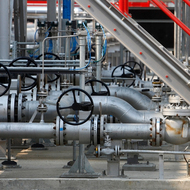The department has detailed key focus points for petroleum and MHF safety in 2018
| Date: | Friday, 12 January 2018 |
|---|
Over the past twelve months, there have been several major processing facilities to start or finish commissioning in Western Australia adding to the number of Major Hazard Facilities in the State.
Dangerous Goods and Petroleum Safety Director Ross Stidolph said like all complex projects, it is a significant challenge to effectively complete construction and implement an orderly staged handover for day-to-day operations.
"Due to the size and complexity of these projects there will inevitably be challenges that need to be addressed as part of this handover," Mr Stidolph said.
"On the whole, the process has been well managed as these projects shift from construction to operation.
"However, it is important that these operators, and indeed all operators, look at safety systems across their facilities to ensure they are effectively managing safety."
The petroleum industry has also seen significant changes in operations and even operators over the year.
Mr Stidolph said there were significant lessons to be learned within WA, Australia and across the world that highlight the importance of long term strategic asset management to ensure a well-planned and orderly staged handover process from one life cycle phase to another.
In December, Mr Stidolph sent letters to petroleum and major hazard facility operators detailing key focus areas for the safety regulator in 2018.
"We wanted to reinforce the importance to site management of key areas such as leadership and accountability, complying with approved safety documentation, and also ongoing asset management," he said.
Mr Stidolph said ensuring aging assets are managed appropriately continues to be an important focus for inspectors.
"A large portion of our facilities and associated infrastructure has reached or is rapidly approaching its design life," he said.
"Maintenance programs are generally corrective in nature and assume the overall condition of the asset and its components are fit for service. As an asset ages, a potential blind spot can be created where operators are relying on a maintenance program that appears effective yet may not adequately address aging asset issues.
"It is critical that operators adopt proactive asset management programs aimed at preventing defects before they occur."
Mr Stidolph said the department’s inspectors will continue to work with industry.
"It is important we work together to further improve safety and reinforce the world-class reputation of Western Australia's petroleum and MHF industries."

